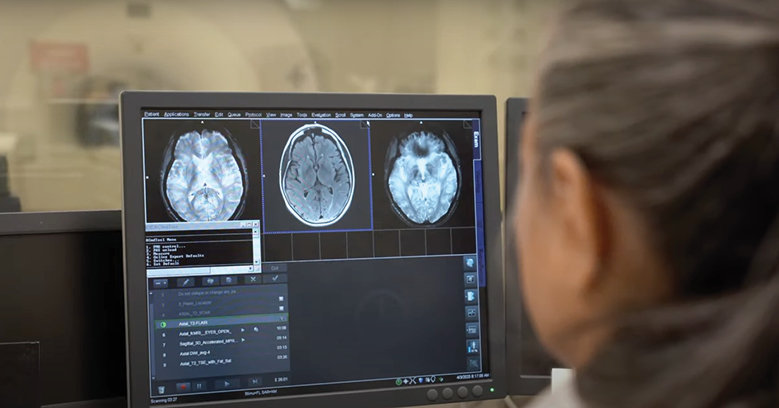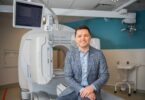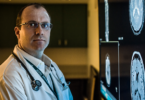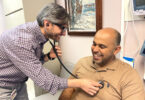“WAIT! Go to the bathroom first!”
Big sister Debbie has always been there for Cindy; this time, as they scurry through hospital corridors, a little late for their first appointment of the day.
Together, the siblings navigate traffic, banter over the long drive from Brantford, and keep on top of appointments. Debbie is a little on edge, given the circumstances. She takes her support role seriously, as she – more than most, due to her career in nursing – understands its importance to patients; her sister, in this case. Cindy, as a result, comes across as laid back and has an energetic spring in her step.
Despite having left early as they always do, the heavy fog and wet morning meant road conditions were heavier than usual. But nothing was going to get in their way…
Cindy is part of a clinical trial, or research study, that is testing an investigative drug therapy for the prevention of Alzheimer’s disease. It is one of many dementia research trials from the Brain Lab in the Dr. Sandra Black Centre for Brain Resilience and Recovery at Sunnybrook Health Sciences Centre.
A volunteer participant for the study, Cindy is required to come in to hospital for regular visits – twice a month in her case, for now. This trip marked a year of visits; expected to continue another four years, for the duration of the five-year study.
Why would someone like Cindy – who shows no symptoms of Alzheimer’s disease – need or want to take that time to participate in such a research study?
When I first heard about this study, I knew right away I wanted to be a part of it. My mother had dementia, Alzheimer’s disease (AD). Seeing mom deteriorate mentally, it was difficult. She would have been in her late sixties, when she started manifesting confusion. She deteriorated; it was tough to see her go downhill. I wanted to learn what my risk was, to see if I could get more information, and what I could do about it”
Cindy Greatex,
clinical trial research participant,
68 years old
Dementia is a term for several diseases that affect memory, thinking, and the ability to perform daily activities, with Alzheimer’s being the most common, contributing to about 60 to 70 per cent of dementia cases.
According to the World Health Organization, the illness gets worse over time and mainly affects older people. Having a family history of Alzheimer’s disease – in particular, if a biological parent or sibling has the disease – increases the risk of developing it.
As a part of the study, Cindy had the option to have her genes tested; she didn’t hesitate. The results showed that she has the strongest genetic risk factor for AD – which means she has a 15 times higher risk of developing the brain disorder than the average person.
As a medical doctor, Sunnybrook cognitive neurologist and brain scientist Dr. Sandra Black knows too well the devastating effects that diseases of the brain can have on patients, their quality and length of life, and their impact to families and loved ones.
Recognized internationally for her contributions to the diagnosis and treatment of vascular dementia, Alzheimer’s disease and stroke, Dr. Black has been compassionately providing care to patients and their families for most of her career, while working to advance research into what we know about the brain. This includes leading 88 clinical trials and training 110 trainees – new generations of clinicians and brain scientists, who have gone on to be leaders in cognition, stroke and dementia across the country.
While there are drug therapies available to help treat some of the symptoms of AD or other dementias (once those symptoms have already developed), there are limited medical options to address prevention, before the disease takes hold.
Yet Dr. Black has never been more optimistic.
Never before did we have the option or possibility of altering the pathway in which dementia develops. Now we’re actually looking at the pathology itself that leads to brain cell damage and cognitive decline. This is an emerging field and we’ve learned the sweet spot in preventing or slowing down Alzheimer’s disease is well before symptoms start.
Sandra Black,
Scientific Director, Dr. Sandra Black Centre for Brain Resilience and Recovery,
Sunnybrook Research Institute (SRI) and
Officer of the Order of Canada
She explains how the focus of therapies in their clinical trial research now is to intervene before the toxic processes behind the disease begin to form – a minimum of 10 to 15 years before symptoms kick in and “have a life of their own”, spreading in the brain.
“If we can do that, then you’re going to avoid it (dementia developing). It’s like stroke prevention: you get worked up, and put on prevention therapies, so you don’t have a stroke.”
The comparison should not go unnoticed, considering that she and her colleagues at Sunnybrook’s stroke clinic were one of the first to provide stroke prevention therapies in Canada in the 1990’s.
For the time being, volunteering to participate in a clinical trial is often the best option for patients like Cindy to access therapies that are not yet available “clinically”; in this case, a drug therapy in an effort to prevent or offset the very start of the disease process.
Receiving the drug, however, is not a guarantee as clinical trials are often randomized and blinded, which means volunteer participants are either selected for the drug therapy itself, or a “placebo” instead – the latter usually is just a saline solution – so Cindy and the research team don’t know which group she falls in.
“There has to be this placebo comparison in order for the study to be controlled, in order to validly test for any effects and differences – good or bad – of a drug being studied,” explains Halil Akbulut, clinical research coordinator in the Hurvitz Brain Sciences Program at Sunnybrook.
Without people like Cindy and her study support partner, we wouldn’t make any progress at all. They’re contributing to our understanding.
Cindy will continue to be closely monitored and tested for the duration of the study. Her sister Debbie is her “study partner”. In addition to providing a supportive role to Cindy, Debbie is part of her “team”, sharing any cognitive, physical or emotional changes she observes while outside the hospital setting. Changes to cognition can include thinking processes such as attention, learning and memory, language, remembering, reasoning, and problem solving.
If Cindy’s cognition or overall health declines, she will be pulled from the study. If it’s found that she was on the placebo, she will be offered the drug therapy as part of the agreement as a participant of the study. If she was on the drug arm of the study, she will continue to be offered it, for as long as she and her care team decide to use it.
I’m learning so much through this study, I’m learning how to eat better, how to sleep better, interacting more with people; so it’s giving me a lot of tools that I can put into place now while I’m going through the study, and I know it will make a difference in my life, to a better quality of life.
When asked if she had any advice to offer others who may be considering a clinical trial, Cindy added:
“If there are clinical studies available, sign up. It helps to find out as well genetically whether you have a predisposition – a higher probability of getting the disease – so there’s so many good points about being part of a study. I encourage people to find out if anything is happening in your community – I’m commuting myself – it’s worth the while to do that.”
Learn more about clinical trials at Sunnybrook »
At any given time, more than 650 clinical trials are taking place across Sunnybrook Research Institute (SRI).
Clinical trials can:
- offer access to potentially life-saving new treatments
- offer comprehensive monitoring and health care from a number of health-care professionals
- contribute to medical advancements, and
- provide a chance to learn more about a condition.
SRI’s BrainLab, part of Sunnybrook’s Dr. Sandra Black Centre for Brain Resilience and Recovery, studies a wide range of clinical, neuropsychological, neuroimaging, and genetic biomarkers within various dementia subtypes, as well as how dementia progresses over time through the collection of longitudinal data.
The BrainLab's research focus:
- Dementia and aging
- Alzheimer's disease
- Small vessel disease
- White matter disease
- Lewy Body Disease
- Frontotemporal dementia
- Vascular cognitive disorders
- Mild cognitive impairment
- Apraxia
- Neglect
- Stroke recovery
- Cerebral Autosomal Dominant Arteriopathy with Subcortical Infarcts and Leukoencephalopathy (CADASIL)
By participating in a clinical trial or other clinical research, you have the opportunity to help us develop new treatments and medical interventions that could transform the future of health care.
Thinking about joining a clinical trial with Sunnybrook’s Brain Lab?
Email: sandrablackclinic@sunnybrook.ca
Hear from our experts and other patients about what it’s like to be part of clinical research:
sunnybrook.ca/clinicalresearch








